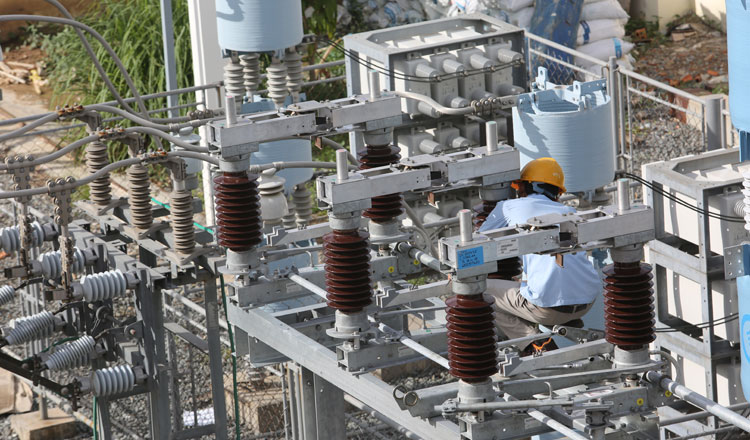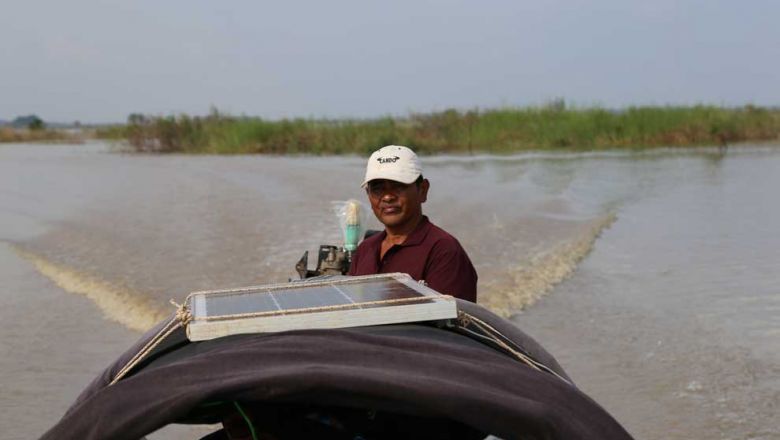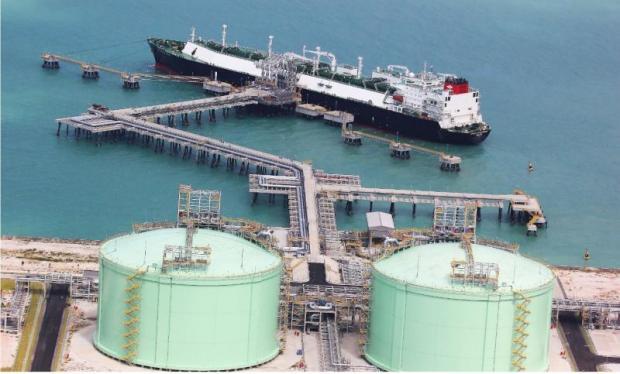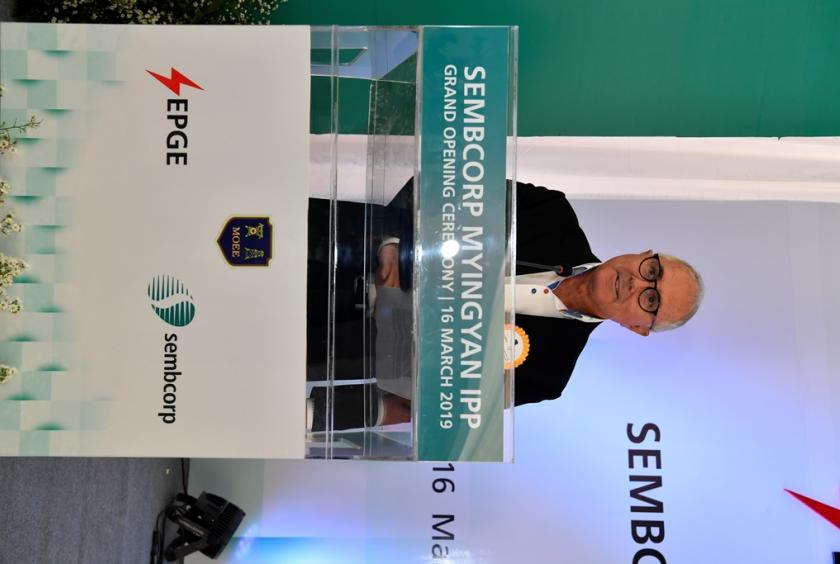itting in her bright and airy 17th floor office, Rithya Menon, Okra Smart Solar’s lead firmware engineer, checks the frequently updating data telling her everything about how well their community services are operating.
“I saw in the data that there was a problem with batteries going down each day. They should be recharging to full power,” she says, referring to Okra’s solar charged batteries running households living off the electrical grid.
Founded in Australia in 2016, Okra is a technology startup that builds IoT (internet of things) hardware and software which enables smart solar smart grids to provide clean, renewable and reliable power to rural off-grid communities.
Okra’s CEO and co-founder Afnan Hannan tells The Post about his vision for the project.
“I have been working on Okra for two and a half years and my mission is to make sure that every single person on this planet has access to energy 24/7 so that they can live modern, technology driven lifestyles.
“Using electricity to learn, to get jobs, to make money and to do all the things we take for granted to make our lives easier – even basic things like using refrigeration,” he says.
Hannan, who hails from the Australian capital Canberra, says that the organisation has developed an innovative power sharing system which minimises waste and maximises connectivity and efficiency.
“We’ve created an IoT controller and this device is installed in every house. The controllers can be connected from one to the next with a cable and lets houses connect together into smart-grids.”
“So if there are solar panels or batteries on any of the houses, the software redistributes extra power from one house to the next minimising wastage and making sure all houses have 24/7 power,” he says.
Okra’s first home featuring an off-grid controller was installed in March last year. Until then, the Okra team spent most of their time in Cambodian communities and with solar energy companies understanding household behaviour and conducting research and development before rolling out their product.
‘Plug & Play’
The difference between Okra and a standalone home solar system is that a standalone system consists of a PV panel and battery that provides limited power to one household only.
In most cases, the panel and battery assets are not sized appropriately so up to 50 per cent of solar generation is wasted as batteries become fully charged just after midday and are drained quickly at night time.
In contrast, Okra’s technology connects solar home systems into smart grids which enables energy sharing.
This means panels and battery sizing does not significantly affect a household’s ability to scale their energy consumption. To do this, households simply needs to “plug” into a neighbouring household on the network, hence “Plug & Play”.
“If we start with one, it still works but it’s a standalone. There is no way to share the power, but if you connect with next house, you can share the power from one to the others and you can also connect more and more houses, and the more you connect, the more they all share together,” says Hannan.
“It’s as simple as plugging a cable from any of the houses into another Okra controller. As soon as they’re connected together, Okra software activates and starts sharing power in the smart network.”
Okra smart grids are used to provide energy for lighting, mobile phone charging, cooking, fans, television and even refrigeration. In the future, Okra aims to make sure their products can meet demand for more power-intensive electronic devices such as air-conditioners, washing machines, e-vehicle charging and other modern appliances.
Right now, 101 households are connected to energy from Okra smart grids in the most rural areas of Takeo and Kampong Speu provinces. The locations in both provinces are far from existing grids and the communities had no power before they were connected to Okra.
“Our vision, is not to just make sure communities have access to energy, but to make sure our partners activate the communities to use energy for improved productivity in the future. So we want our partners to show communities how refrigeration, water pumping and even online education and mobile phone use can help them generate more money,” says Hannan.

Okra Smart Solar’s lead firmware engineer Rithya Menon (left) and Okra’s co-founder Afnan Hannan work at their office in Phnom Penh. leap tepitou
“We have taken the startup engineering approach. We’ve learned a lot from these 100 households and right now we’re optimising our product from these lessons and we’re also changing how we encourage our partners to roll the technology out – community activation is one of those lessons. Our next product iteration is going to be even more cost effective for the community and we’ve got plans to have our technology energise thousands or even tens of thousands of families within the next 18 months.”
99.9% uptime
He said Okra uses smart algorithms and machine learning distribution to ensure minimal power loss and maximum reliability and efficiency. The grids have 99.9 per cent uptime, even during the hot months, which over the past few weeks with power cuts scheduled in Phnom Penh, have surpassed the reliability of the Cambodian national power grid.
“People in remote communities still use diesel and kerosene that is very expensive. It costs from 10 to 100 times more to use Kerosene than it does to use electricity from Okra networks, and all Kerosene can do is provide poor lighting and fuel for cooking,” Hannan says.
Okra has a team of ten people that includes engineers from the US, Australia and England, as well as researchers from Russia and China and a Cambodian project manager.
“We are not saying that we are the best solution in every single area. If families need massive loads like air-conditioners there needs to be a different solution. But if all a household uses electricity for is to pump water and refrigeration in remote areas, Okra is a really good option.
“Our partners set up Okra in Kampong Spur and Takeo provinces in the regions where the electricity grid is far away, meaning people wouldn’t get connected for a while. In these areas, for sure, compared to grid extension or even standalone solar home systems, Okra is not just cheaper, but also more reliable,” says Hannan.
Okra’s partners who install the technology charge their customers a monthly fee, similar to an electricity bill. Families pay between $5 and $15 per month, with a deposit of between $20 and $30. However, houses are significantly reducing the amount they spend on diesel and kerosene, which sometimes amounts to $50 per month. A further upside is that now they also have 24/7 energy from clean solar power.
Hannan says Okra has grand visions for Cambodia, Southeast Asia and eventually the world.
“Energy as a service model from connected solar home systems is unique worldwide . . . Since we’ve rolled it out in Cambodia, we’ve received demand from countries around the world, including the Philippines, Indonesia and all the way to Kenya and Nigeria. But right now, we’re focused on Southeast Asia.
“The Cambodian government’s goal of providing nationwide electricity by 2023 is fantastic. But our plan is to work with authoritative bodies to find out which areas are hardest to reach so those communities can be setup with Okra smart networks and benefit from energy access today,” he says.










